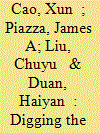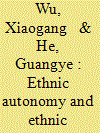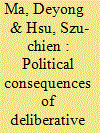|
|
|
Sort Order |
|
|
|
Items / Page
|
|
|
|
|
|
|
| Srl | Item |
| 1 |
ID:
159542


|
|
|
|
|
| Summary/Abstract |
In this article we study the Chinese banknote designs since the founding of the People's Republic of China in 1949. We first analyze the six editions (five issued and one unissued editions) of banknotes in the theoretical tradition for studying world society and its cultural shifts. The Chinese banknotes are found to go against the general trend of moving from designs featuring traditional goals and state actors to those displaying postmaterialist goals and individual actors. To help explain this phenomenon, we entertain and apply two alternative explanations, one based on the trend of increased political centralization and inward-looking tendency and the other applying a theoretical model built upon the literature on collective focus, to the Chinese currency for a better understanding of the changes in Chinese banknote designs. The trajectory of Chinese banknote designs reflects the tendency toward political centralization and a singular collective focus, with fluctuations in the middle period. We further discuss banknote design as a collective memory project and the transition in collective focus as a way of managing such a project.
|
|
|
|
|
|
|
|
|
|
|
|
|
|
|
|
| 2 |
ID:
159543


|
|
|
|
|
| Summary/Abstract |
Unrest in the Xinjiang region of China currently poses the most imminent threat to the internal security of China and to central government control over peripheral regions. Instability in Xinjiang, furthermore, has ramifications for the wider security environment in Central Asia as the conflict becomes linked with jihadist groups in other security hotspots, like Pakistan and Syria. However, our understanding of important potential factors affecting political instability in Xinjiang is limited by the lack of systematically collected event data of ethnic violence. In this article, we introduce the first effort to fill this gap in data collection, that is, the Ethnic Violence in China (EVC) Database: the Xinjiang Region. This is a geocoded database of yearly incidents of ethnic violence at the county level in Xinjiang from 1990 to 2005. Using the EVC database, we demonstrate some initial results modeling ethnic violence in Xinjiang. We find that ethnic violence is positively associated with interethnic inequality; resources such as oil and cotton, on the other hand, are unrelated to the likelihood of ethnic violence.
|
|
|
|
|
|
|
|
|
|
|
|
|
|
|
|
| 3 |
ID:
159541


|
|
|
|
|
| Summary/Abstract |
Using individual-level survey data while incorporating county/district-level information on per capita gross domestic product, this study finds that economic development in China has a dual effect on popular trust in the central government. First, positive individual-level perception of family economic conditions (compared to the past) increases trust in central government. Second, county/district-level per capita GDP is negatively correlated with individual-level trust in the central government. Methodologically, the article suggests that researchers may conduct contextualized thought experiment to establish logical priority of one event over another, particularly when it is impractical to empirically determine the temporal sequence of phenomena that are observed simultaneously in cross-sectional surveys. The article also suggests that China scholars may employ cross-region comparison as a substitute for longitudinal research when it comes to projecting long-term effects of quantitatively traceable changes such as economic development.
|
|
|
|
|
|
|
|
|
|
|
|
|
|
|
|
| 4 |
ID:
159545


|
|
|
|
|
| Summary/Abstract |
To balance ethnocultural diversity with national integration, the Chinese government started formulating a series of ethnic policies in the early 1950s, including policies on identifying and classifying ethnic groups, a system of regional ethnic autonomy, and a set of preferential treatment policies toward 55 minorities. This article aims to examine socioeconomic disparities between ethnic minorities and the Han majority in China, focusing on the role played by regional ethnic autonomy. Based on a large sample of China's mini-census data collected in 2005, we show that among nonfarm working populations, minorities are more likely than the Han to become managers/professionals or obtain high-status occupation, regardless of whether they are living in their own autonomous jurisdiction or other places. Minorities are paid lower wages, however, even after controlling for other characteristics, and the gap is even wider in autonomous jurisdictions than elsewhere. Finally, children of mixed Han-minority marriages in ethnic autonomous jurisdictions are more likely to identify themselves as minorities, especially those holding urban registration status (hukou) whose parents have received more schooling. Our findings bear important implications for the current debate on ethnic policy in China.
|
|
|
|
|
|
|
|
|
|
|
|
|
|
|
|
| 5 |
ID:
159544


|
|
|
|
|
| Summary/Abstract |
In the spring of 1962, a mass exodus took place in Ili Kazakh Autonomous Prefecture, the Sino-Soviet borderland in northwest Xinjiang. More than 67,000 border inhabitants, most of whom were ethnic Kazaks, managed to flee to the Soviet Republic of Kazakhstan. While the mass exodus had a wide-ranging impact, the factors that caused this incident remain debatable. Using archival documents from Xinjiang and Beijing, the author argues that both domestic and foreign causes contributed to this incident. In addition to the great famine, multiple factors played important roles in causing the mass exodus, including state policies regarding the Sino-Soviet commerce, ethnic tensions between the Han and the local ethnic peoples, political campaigns targeting at ethnic elites, and the deterioration of Sino-Soviet relations. It is also revealed that only after the 1962 incident did Beijing successfully transform the fragile suzerainty of Xinjiang's three districts, Ili, Tacheng, and Altay, into full sovereignty. In this regard, the birth of modern Xinjiang, as a frontier borderland of PRC China, occurred only in 1962 rather than in 1949.
|
|
|
|
|
|
|
|
|
|
|
|
|
|
|
|
| 6 |
ID:
159540


|
|
|
|
|
| Summary/Abstract |
By bridging the news diffusion perspective with collective action studies, this article examines how collective action stories flow between websites and how such diffusion trajectories are shaped by the nature of protests and the institutional features of Chinese media. We first propose a dynamic typology to map China's activism in the digital era within two dimensions: action logic (collective versus connective) and event entrepreneurs (with versus without). We then analyze the news trajectories of three prominent cases and find a strong association between the nature of collective action and state–media interactions. When event entrepreneurs—sympathetic elites such as journalists, lawyers, academics, and netizens—compete to narrate the reality through a protest, political control serves as the dominant mechanism of movement–press dynamics. As activism moves from collective logic toward connective action, the influence of journalistic professionalism on news trajectories can be seen. This study offers a contextualized account to understand the nuanced dynamics between the state, the media, and social movements, and it also presents a framework for analyzing how activism plays out in China in the digital era.
|
|
|
|
|
|
|
|
|
|
|
|
|
|
|
|
| 7 |
ID:
159539


|
|
|
|
|
| Summary/Abstract |
Recent research suggests that both electoral democracy and deliberative democracy under a nondemocratic regime may help to sustain existing authoritarian rule but is likely to eventually lead to the democratization of authoritarian regimes by eroding its basis in the long term. However, few studies have used comparative methods to empirically analyze the political effects of these two types of democracy together. In this article, we use survey data and in-depth interviews to empirically analyze two local political reform experiments in China. Four fieldwork sites were selected: two where democratic experiments have been implemented and two where no political reform has been implemented. We compared the political consequences of the two locations of democratic reform experimentation using indicators such as political trust, administrative performance, and democratic aspirations. The results show that the electoral democracy experiment delivered better governance and higher political legitimacy than the deliberative democracy experiment, while deliberative democracy performs better than the usual township governance system. Although the results show that the electoral democracy experiment fosters higher democratic aspiration, strong evidence verifying the causal mechanism between deliberative democracy experiment and appeals for democracy has not been found. Based on the empirical findings, we discuss the implications of the two experiments for China's politics.
|
|
|
|
|
|
|
|
|
|
|
|
|
|
|
|
|
|
|
|
|